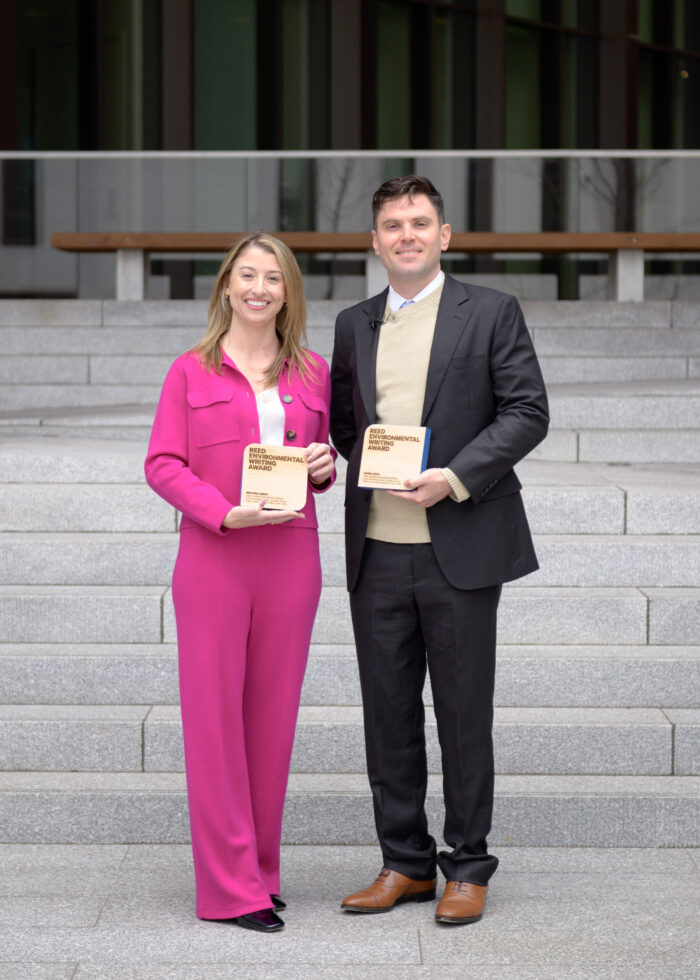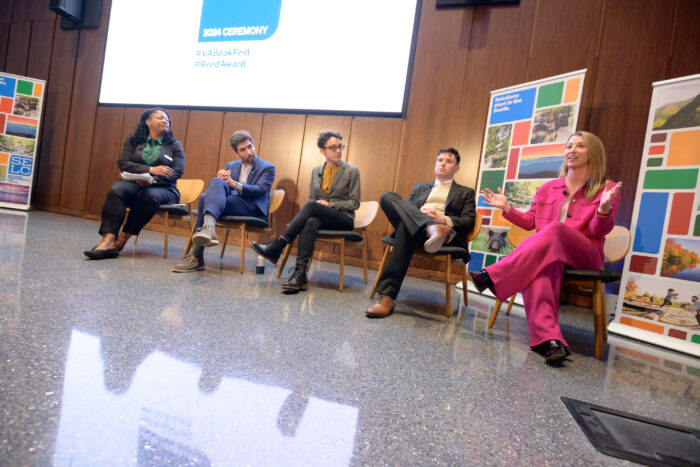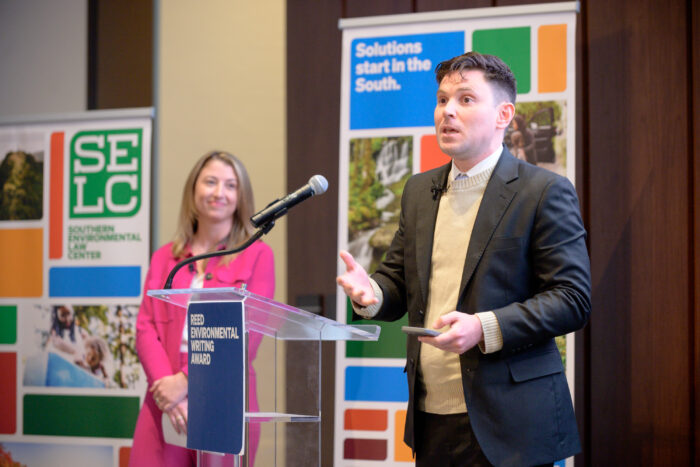Floodlight reporters dive deep into power company corruption

Floodlight doesn’t just scratch the surface of a story — they dive deep. Using old-fashioned, boots-on-the-ground methods, the nonprofit newsroom works tirelessly to investigate the corporate players and policies impeding climate action in the South and across the country.
Behind the mic, investigative reporter Mario Ariza and Floodlight’s Director of Investigations Miranda Green ask the tough questions to stop the spread of misinformation and shine a light on the shady dealings stalling effective climate solutions. The duo was honored at SELC’s 2024 Reed Awards for an expose published in partnership with David Folkenflik of NPR that uncovered a scheme by major Southern utility providers to manipulate news coverage in their favor.
We caught up with the trailblazing journalists to chat about the importance of telling investigative climate stories, how to build trust with a community, and what they’re digging up next.
The interview has been edited for length and clarity.
Why is it important to tell investigative climate stories about how powerful interests are working to stall climate action?
Mario: Right now, climate change isn’t a technical problem, it’s a political problem. We know how to fix it, we know what’s causing it, but there are moneyed interests who do not want to transition at the rate that science indicates we need to — or who don’t want to transition at all. And that’s okay. We understand they have a lot of money that they’re making from this stuff, but it’s in the public’s interest to understand exactly what they’re doing. It’s also just a crazy story. I had no idea any of this was going on until I started looking. It’s like something out of Watergate sometimes.
Miranda: And it’s more common than you realize, too. The business model behind these companies — and not just what they do, but how they do what they do — is complicated and complex. If you’re not really paying attention and diving into their documents, you’re not going to be able to figure out how they’re kind of getting away with it.
Floodlight is specifically focused on looking at these groups because no one else really is. It’s too complicated, it’s too time-consuming, and there’s just not enough money that people are investing in investigative work to do this.
How did people respond when the truth about these companies started coming to light?
Miranda: With frustration, disillusionment, and just bitter resentment. They are frustrated to find out that they’ve been unknowingly reading manipulated news is just another example of collusion and corruption, which oftentimes is to their disadvantage.
If you’re somebody who pays taxes and expects services from the government, you are being affected by the death of journalism in a terrible way.
Mario Ariza, Investigative Reporter
Can you share an impactful memory from your reporting?
Miranda: I really connected with one of the story’s main characters. Often, there’s no good guy. You have consultants, power companies, and politicians, but the good guys are usually just everyday people who have no idea that any of this is going on.
But Terry Dunn was a bit different. He wanted to be the good guy. He was just an everyday person trying to figure out why power bills were so expensive for everyone in the state, and he was attacked for it. People were calling him an Obama-era environmentalist while he was a staunch republican who voted for Trump.
Voters turned against him and didn’t vote him back in office. He moved away and chose a much quieter life. Basically, his final words were “You did this to yourself, so now eat your cake.”
You’ve said that journalism relies on the currency of trust. Do you have tips for building trust with a person or a community?
Mario: In my experience, being completely honest and transparent with people about where you’re coming from, why you’re talking to them, what your motivations are, and what they can expect out of interacting with you is the most important thing. I talk to people who are in government and white shoe law firms, and I also talk to people on the street who have no idea how journalism works. And being transparent with them is really, really key.
Miranda: I think face time is the best way to build trust. So many times I interview people for stories and don’t end up using them, but I feel like every interview you have with a person is a good way for them to understand how journalism works. We’re facing a lack of trust in media in general, so it went from being like, “I need to make sure these people give me good quotes,” to “I want to make sure these people believe I am trustworthy and a human.”
At the end of the day, I’m writing every piece for the person who pays their power bills, or a person who’s going to deal with sea level rise, or a person who just doesn’t understand why there are three guys with the same name on their ballot.

Who do you think is most affected by newsroom cuts across the country?
Miranda: So much of the reporting I’ve been doing as a spinoff of this story is about how news deserts allow communities to be easily manipulated. We’re seeing utilities like Alabama Power and oil and gas companies like Chevron taking advantage of the fact that there is waning trust in mainstream media and fewer local newspapers, but still people desperate for information. That’s why they’re either buying or creating publications to push their own narrative.
Readers are the ones who, at the end of the day, are the most impacted because they’re either getting no information or manipulated information.
Mario: If you’re somebody who pays taxes and expects services from the government, you are being affected by the death of journalism in a terrible way because of the loss of accountability and of attention being paid to a whole host of very important, often boring and mundane things like city council meetings. Somebody who isn’t paid by any of the people involved needs to be there watching. Communities that don’t have local newspapers statistically pay higher taxes because nobody’s catching the B.S.
Can you give us a tease of what you’re working on next?

Miranda: I have another story coming out next week with David Folkenflik of NPR. It’s our fourth story together and it’s about a fossil fuel company that runs a paper in a news desert in a small town in California.
Mario: We’re working on a rolling investigative series on power company project corruption. Our first story was a 30-year analysis that picked up on a generational increase in power company fraud and corruption. We’re also going to be looking at the power and influence of public utilities commissions across the country. Right now I’m fighting really hard to get more documents out of the first energy bribery case in Ohio.
What are you reading or listening to?
Mario: I just read All the President’s Men for the first time, and then the follow up, The Final Days. It’s the Bob Woodward and Carl Bernstein third-person narration of how Nixon besmirched himself and left the White House. It is absolutely worth reading. I would recommend it to everybody.
Miranda: I’m actually reading a fiction book, Birnam Wood. It’s a climate dystopian novel that has to do with critical mineral mining. A billionaire who seems like he’s backing an environmental organization is actually using it as a front to extract all this money for himself. I feel like I could have written it just based on some of the stuff I’ve reported on.
